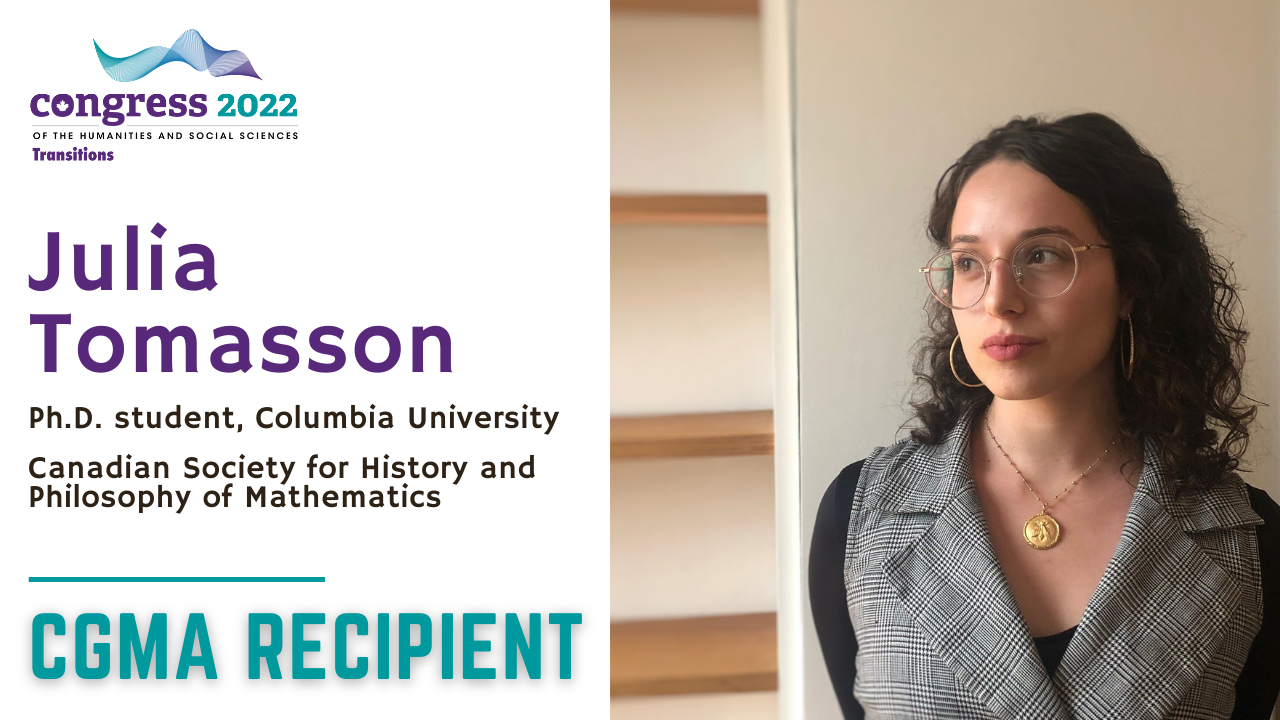Nominated by member scholarly associations of the Federation for the Humanities and Social Sciences, the 2022 Congress Graduate Merit Awards recognize exceptional graduate students who will be presenting their work at the Congress of the Humanities and Social Sciences.

Tell us about yourself.
I am a Ph.D. student at Columbia University in New York studying the histories of science, mathematics, and information technologies across early modern Eurasia and Northern Africa. I am interested in historical epistemology—that is, studying the evolution of things like ‘evidence,’ ‘proof, ‘facts,’ and different styles of argumentation, persuasion, and ‘knowing.’
List the scholarly association(s) of which you are currently a member.
- Canadian Society for the History and Philosophy of Mathematics
- Canadian Society for the History and Philosophy of Science
- History of Science Society
At which conference(s) will you be presenting and/or attending?
The Canadian Society for History and Philosophy of Mathematics / La Société Canadienne d’Histoire et de Philosophie des Mathématiques 2022 Annual Meeting
What is the title of your Congress 2022 presentation?
“Reading Uqlīdis in New York: The Making and Unmaking of “The Arabic Euclid” in Columbia University’s Rare Book and Manuscript Library”
How would you describe the research you will be presenting at Congress 2022?
My presentation uses the many lives of a single book to survey broader longue durée changes in the global landscape of knowledge production and consumption: Euclid’s Elements of Geometry—one of the most important books in mathematics, used as the standard geometry textbook for over two thousand years. My research focuses on the lives that this book had in Arabic (and Persian!) in the medieval and early modern world, as well as the attempts of modern orientalist historians and mathematicians to collect, understand, and impose order on the diverse traditions of this text in Arabic. My presentation uses manuscripts and printed materials from Columbia University’s Rare Book and Manuscript Library to highlight the tension between the ‘universality’ of the truths of geometry that Euclid’s Elements came to represent and the polyvocality and cultural embeddedness of the Arabic and Persian manuscript traditions.
How does the research you will be presenting connect with the Congress 2022 theme, Transitions?
My research is fundamentally about transitions in and between different forms of knowledge, language, media, culture, and history. Some transitions I discuss in the presentation are transitions qua translations (from Greek to Arabic, Arabic to Persian, Arabic to Latin, Arabic to English); qua transformations (from manuscript to print cultures and between different textual and formal traditions); qua transmissions of knowledge (via reading, listening, or traveling); qua political transitions (the rise and fall of dynasties, empires, and different forms of rule); qua social and cultural transitions (changes in the who/what/where/when/why of learning, knowing, and spreading knowledge).
Share your hopes for Congress 2022.
I am really excited to be part of such a large, international gathering of historians and philosophers of mathematics! I’m also eager to learn about what other historians and philosophers of mathematics have been working on, learn earn new things from their presentations, and also be able to get feedback from an audience who knows their Euclid!
